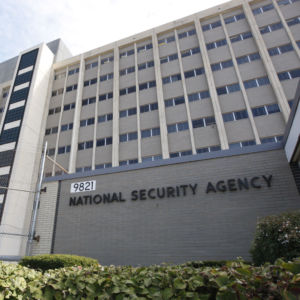A lawsuit brought against broad National Security Agency surveillance programs will go forward as a result of a Tuesday federal appeals court ruling, a reversal of a lower court that ruled there wasn’t sufficient evidence NSA spied on Wikimedia.
Three judges on the Fourth Circuit Court of Appeals in Richmond, Virginia Tuesday ruled Wikimedia — the nonprofit organization behind Wikipedia — will be allowed to proceed with its case against NSA upstream surveillance programs. A lower court in December 2015 ruled Wikimedia, the ACLU, and others failed to prove their communications were being monitored by NSA.
“Wikimedia has plausibly alleged that its communications travel all of the roads that a communication can take, and that the NSA seizes all of the communications along at least one of those roads,” judges wrote in the Tuesday decision.
The panel will allow the organization to sue the government for Fourth Amendment violations of Americans’ privacy and First Amendment violations of free speech. Wikimedia argued such surveillance has a chilling effect on users, who censor themselves based on knowledge of the programs leaked by former NSA contractor Edward Snowden in 2013.
“Thus, at least at this stage of the litigation, Wikimedia has standing to sue for a violation of the Fourth Amendment,” the court continued. “And, because Wikimedia has self-censored its speech and sometimes forgone electronic communications in response to Upstream surveillance, it also has standing to sue for a violation of the First Amendment.”
Plaintiffs including Amnesty International, Human Rights Watch, and others filed the case in March 2015 to challenge NSA’s “upstream” surveillance — when the signals intelligence agency taps the physical infrastructure of the internet, such as undersea fiber cables, to surveil the content of foreigners’ emails, instant messages, and other communications as they exit and enter the U.S.
Upstream surveillance is legal under Section 702 of the 2008 FISA Amendments Act, and allows NSA to surveil Americans communications with foreign targets overseas. According to rights groups, it also facilitates a loophole that lets NSA “incidentally” sweep up unrelated data belonging to Americans in the process.
While the agency has for years rebuffed congressional requests for an estimate of the number of Americans incidentally surveilled via upstream surveillance, some estimate it could account for millions to tens of millions of warrantless interceptions.
“If people look over their shoulders before searching, pause before contributing to controversial articles, or refrain from sharing verifiable but unpopular information, Wikimedia and the world are poorer for it,” Wikipedia founder Jimmy Wales said in March 2015 when the ACLU filed the case.
The U.S. District Court for the District of Maryland granted a government motion to dismiss the case in 2015 on the grounds the plaintiffs “had not plausibly alleged that their communications were being monitored by the NSA,” according to the ACLU, whose attorney, Patrick Toomey, argued the case and its appeal last December.
Now the case will go forward, but with Wikimedia as the sole plaintiff. Two judges ruled the remaining eight plaintiffs still failed to make a strong case they were likely surveilled by NSA. The larger scope of Wikipedia and its tens of millions of users make its claim sufficiently plausible within the broad scope of the agency’s various upstream programs.
“This is an important victory for the rule of law. The NSA has secretly spied on Americans’ internet communications for years, but now this surveillance will finally face badly needed scrutiny in our public courts,” Toomey said Tuesday. “Our government shouldn’t be searching the private communications of innocent people in bulk, examining the contents of Americans’ emails and chats day in and day out. This mass surveillance threatens the foundations of a free internet.”
The ACLU challenged upstream surveillance once before in Amnesty v. Clapper, dismissed by the Supreme Court in a 5-4 decision in 2013. At the time, the court said the ACLU lacked evidence to show parties in the case were surveilled.
They tried again after agency slides leaked by Snowden detailing Section 702 programs like “Prism” and “Muscular” showed NSA targeted Wikipedia and its users, and even included the website’s logo in one such slide.
In April, NSA ended the upstream practice of collecting Americans’ email and text messages exchanged with overseas users that simply mention search terms — like an email address belonging to a target — but isn’t to or from a target, known as “about” surveillance.
Privacy advocates including the ACLU celebrated the move, but noted it isn’t permanent, and that Congress should address upstream surveillance via legislation before renewing the FISA Amendments Act when it expires in December.

